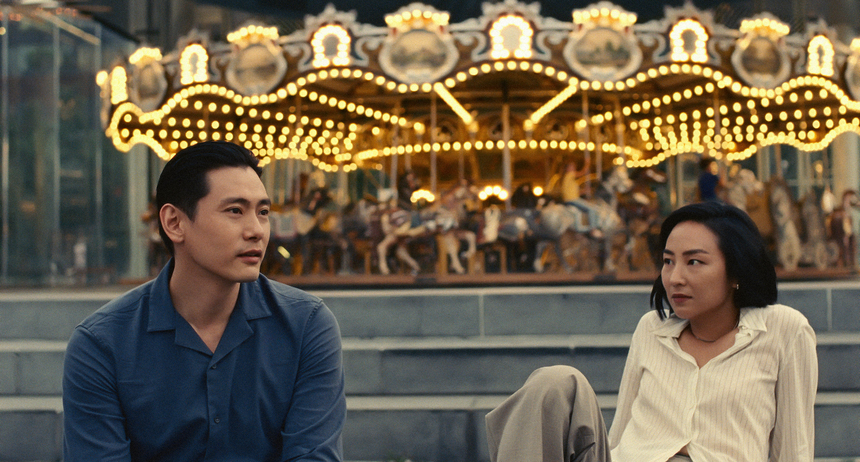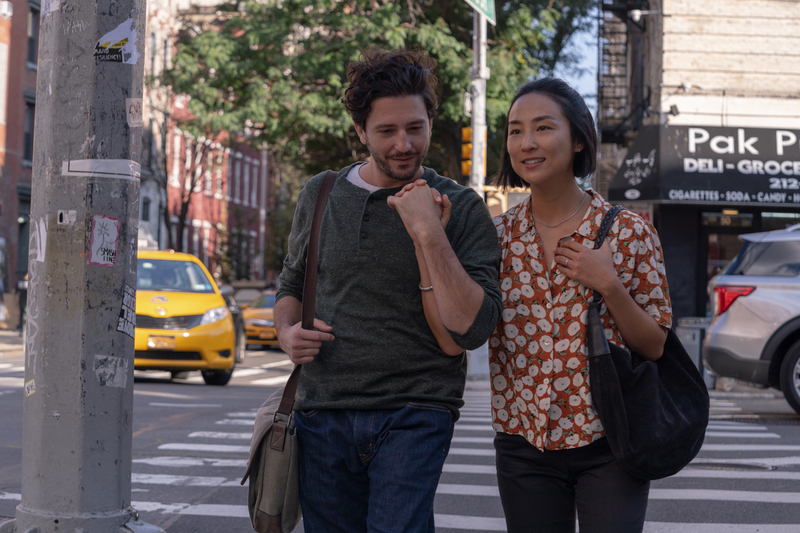PAST LIVES Review: The Loves Not Taken
Greta Lee, Teo Yoo, and John Magaro star in Celine Song's debut romantic drama.

How many times are we told that, when we meet 'the one', we'll know. Setting aside the pedastal onto which romantic love is placed, it's still something fundamental to so much of our cultural understanding - that each of us has one person that was meant for us, whom we in turn were meant for, that any understanding of who that person might be, when and how we should meet, and most importantly, how this integrates into the life we imagine and we might have built for ourselves.
Noted Korean-Canadian playwright Celine Song has crafted a remarkable debut based around these ideas. Past Lives is a deeply considered and sensitive portrayal of two people who can't figure out if what they feel is what is meant to be permanent, or part of a particular time and place that has too long passed. With indredible performances and a mood that infused each frame, it's a film that truly seeps through your body like a slow flame.
Nora (Greta Lee, Russian Doll) and Hae Sung (Teo Yoo, Decision to Leave) were childhood sweethearts in their home city of Seoul, until Nora's family immigrated to Toronto. 12 years pass and they reconnect in their college years, where Nora has now moved to New York to pursue her dream of being a playwright, while Hae Sung is thinking of going to China. Their reconnection becomes habit-forming, until Nora ends it, and then another 12 years pass and Hae Sung decides to visit the now married and successful Nora, and her husband Arthur (John Magaro, First Cow) in the USA.
When Nora and Hae Sung are young, they both believe they love each other (though they never express that), and that they are fated to be together. When they find each other again the first time, Nora is isolated from both her birth culture and her adopted culture - even the small detail of her 'Niagara Falls Canada' t-shirt suggests this dividing point; and Hae Sung seems indifferent to his own ambitions (whatever they are). Showcasing how time differences and technology problems can make communication across time zones both a miracle and a constant frustration, Song embues this distance between Nora and Hae Sung with that longing, that wonderment, that constant question if what they had was a product of an innocent childhood, or if they are fated for each other.
Both Nora and Hae Sung look and feel small against the backdrop of their cities, both in a forest of skyscappers in their respective New York and Seoul; as a consequence, they find solace in each other. But Nora either realizes perhaps that this sinking into nostalgia is dangerous, or her own life ambitions simply outweight her romantic feelings, which she is hesitant to trust. Lee gives us every moment of Nora's choices, the brief movement of her eyes or bow of her head show how this weights on her, how it would weigh on us if we didn't know if we were giving up the love of our life.
Can fate be forced into being, if it does not happen naturally? Are the paths we end up taking seemingly at random, the ones that we were meant for all along? These are the questions that Nora and Hae Sung ask themselves as they reconnect. Nora seems to have accomplished her career ambitions, yet her love life happened almost by chance, even almost unromantically when broken down into its brief factual moments, by her and Arthur. Hae Sung seems stuck in a pre-ordained life - we never find out what his job is, only that he feels it's what he has to do to survive, it's not fulfilling, not does he see it as adequate to support a wife and family.
But this is not just a story of love, but of immigration, both literal and figurative. Nora has immigrated twice - once not of her choice, and once of it, so her distance from her original Korean self feels both distant and yet a constant reminder. Hae Sung's attempt at finding a new life outside Korea seems to stop before it begins. Even Arthur knows, as Jewish person, he'll never quite be accepted in his own country.
Song's dialogue finds that perfect ground between the awkward small talk that speaks around what we want to say, and the direct conversation that carries the weight of the years and the moments of clarity that are filled with longing, regret, and acceptance. This is working in tandem with brilliant framing work by cinematographer Shabier Kirchner (Small Axe), that often frames the actors often in tight space, showing how tightly they feel constrained by their choices. Each frame, each moment, those with dialogue and without, are filled with so much at times it's almost overwhelming. Song understands how much these kinds of moments fill our brains with thoughts and feelings, that they will be what we remember as we get older.
We could all live so many lives in a single lifetime; maybe the reason we wish for past lives is that we can imagine all we can accomplish, and the many people we could be with, in ways that our contemporary world makes almost impossible. Past Lives is deceptively unrestrained in its exploration of how we decide what we were meant to do and who we were meant to be with, and the acceptable regret that comes even when we've made a good choice.
Past Lives is currently screening in selected cities across the USA, and opens on Friday, June 16th in selected cities in Canada.
Past Lives
Director(s)
- Celine Song
Writer(s)
- Celine Song
Cast
- Greta Lee
- Teo Yoo
- John Magaro








